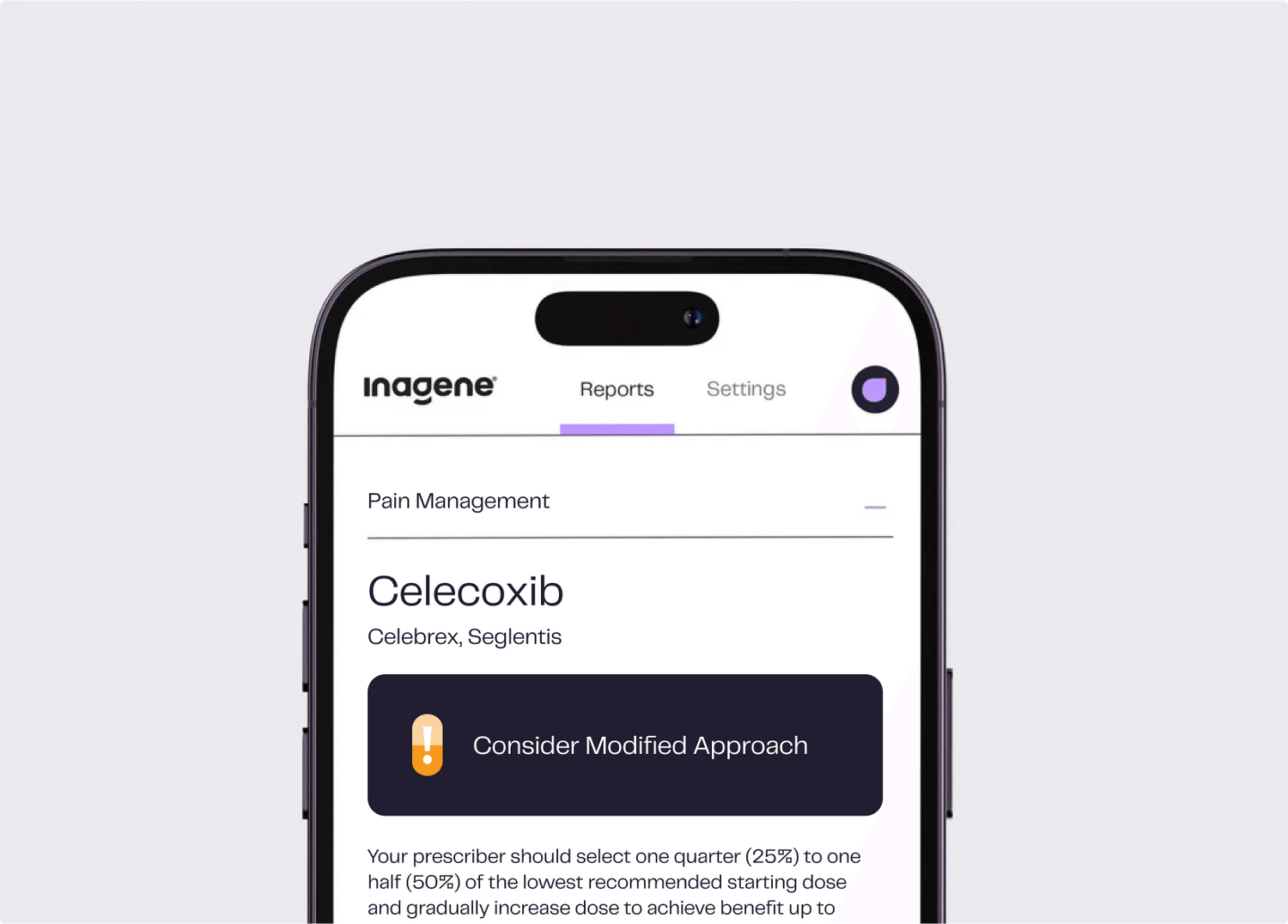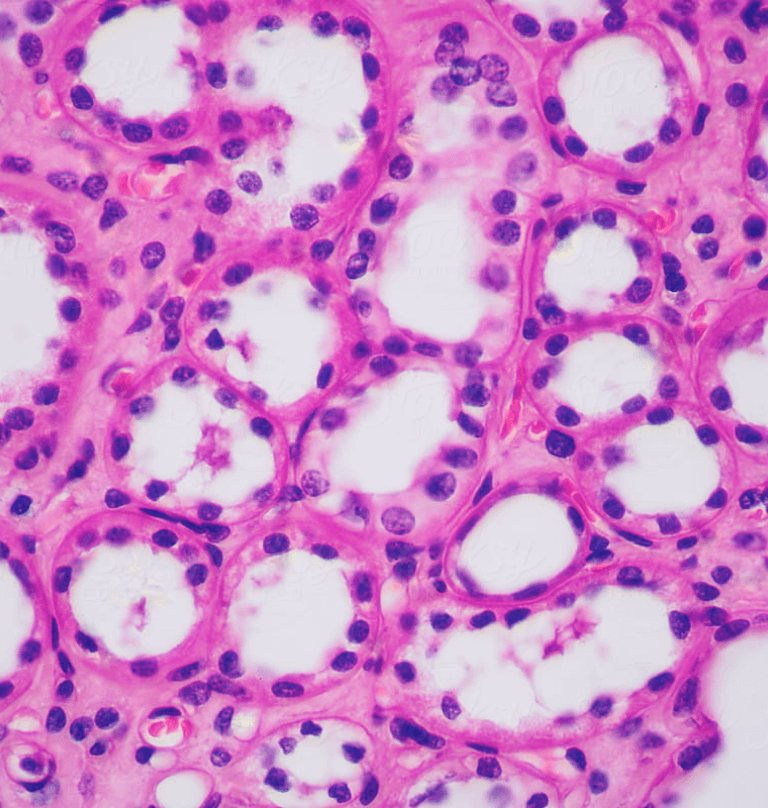What's New
How Pharmacogenetic Testing Guides Your Doctor's Treatment Choices

How Pharmacogenetic Testing Guides Your Doctor's Treatment Choices
It may surprise you to learn that over 99% of people have genetic variants that affect their response to medication. [1] That’s where Inagene and the science of pharmacogenetics come in — allowing you to identify the variants you carry, and find safer, more effective treatment with your healthcare provider. Read on to discover how doctors use genetic test results to provide personalized health guidance.
What do testing reports communicate?
After your cheek swab is analyzed in our laboratory, you’ll receive your test results in the form of personalized insights in your Inagene account. These insights contain easy-to-understand recommendations on how your unique genetic makeup affects your body's response to medications. It provides details about safety risks, side effects, effectiveness, dosing, and altered metabolism, depending on the medication. This can help you and your health care provider(s) determine which medications might be worth using and how, and which medications to potentially avoid.
Below is an example set of results that provides insights on two medications. The first, the antidepressant venlafaxine, should not be prescribed because of known side effect and reduced effectiveness risks associated with certain genetic variants. The second, the anticonvulsant brivaracetam, should be modified when prescribed to account for genetic variants present, as this may help to reduce side effects. These personalized insights are found in the “Detailed Recommendations” section, and are available for every medication reported on in your results.
Consider Alternatives
Venlafaxine
Effexor XR
Antidepressants - SNRI
Response to medication may be impacted by gene: CYP2D6 (Intermediate Metabolizer)
Your prescriber should avoid prescribing you this medication. Medications that are not impacted (or to a lesser extent) by CYP2D6 include duloxetine, mirtazepine, escitalopram, citalopram and sertraline. If venlafaxine is used and side effects occur, your prescriber should reduce your dose and monitor the effectiveness and side effects, or do specific blood work to check for concentrations of venlafaxine (and o-desmethylvenlafaxine, a by-product created in your body).
Source: DPWG
Consider Modified Approach
Brivaracetam
Briviact, Brivlera
Anticonvulsants
Response to medication may be impacted by gene: CYP2C19 (Poor Metabolizer)
You are at an increased risk of experiencing a higher concentration of medication in your body, and an increased risk of side effects. Your prescriber should consider lowering your dose if you are a poor metabolizer.
Source: FDA
Who provides the test result recommendations?
The recommendations provided in your personalized insights are sourced from established, evidence-informed guidelines from trusted pharmacogenetics experts and other reputable sources. We incorporate testing of genetic variants from a diversity of ethnic groups whenever possible, including underrepresented groups of non-European ancestry.
Our internal team of experts evaluate new guidelines, ensuring that only high-quality, clinically-relevant recommendations are included in your results. We never use preliminary data, which can lead to misguided recommendations and inaccurate genetic test results interpretation.
All genetic analysis is performed by trained laboratory technicians in our COLA and CLIA-accredited Toronto lab. These accrediting bodies ensure that testing laboratories meet quality control and accuracy standards, and certify that the results are accurate and reliable.
Genetic variant selection and gene-drug associations are reviewed and approved during the test development process by Dr. Katherine Siminovitch, and evaluated biannually to maintain clinically accuracy.
Are test results and recommendations easy to understand?
Our Complete Health test provides recommendations on medication use that are simple to interpret and understand. Inside, you’ll find a list of all medications, based on the gene-drug interactions that were identified through testing. Four classifications provide you with quick insight into the general results of the test for each specific medication:
Consider Alternatives
Genetic variant(s) potentially impacting response to this medication were identified. This medication may not be appropriate.
Consider Modified Approach
Genetic variant(s) potentially impacting response to this medication were identified.
Use Standard Precautions*
No genetic variants impacting response to this medication were identified.
Use Standard Precautions (Preferred)*
Genetic variant(s) potentially improving response to this medication were identified.
From here, the “Detailed Recommendations” section provides a clear and comprehensive analysis of the predicted response to all medications included in your results, including personalized recommendations regarding their use. Your DNA-based medicine results are listed by the drugs’ generic names and in alphabetical order for user-friendly review.
A high-level summary of the overall results is also available in the “Report Overview” section. You can sort this summary to suit your needs — by drug class, generic or brand name, therapeutic area, or in alphabetical order. If a medication isn't on our list, it's often because there hasn't been sufficient scientific study to establish genetic factors influencing an individual's response to that medication.
How your doctor can use Inagene test results
The knowledge gained from PGx test results helps healthcare providers give patients the best care possible. These test results reveal which medications can improve health outcomes more effectively, allowing doctors to prescribe personalized treatments that avoid safety risks and reduce side effects by 30%. [2]
Medication Genetic Testing
Each year, an estimated 200,000 Canadians have a severe reaction to medication, according to adverse drug reaction reporting in Canada. Drugs and doses that work well for one person often don’t work for others, and this can be significantly influenced by genetics. Take depression medications, for example — only about one-third of those with depression respond well to the first drug prescribed [3], but many spend weeks or months cycling through drugs and doses, enduring persistent symptoms and/or side effects. With PGx, the likelihood of depression remission can increase by 85% [4], as patients are able to continue treatment safely, comfortably, and long enough to see real results.
No matter the health concern — including cardiovascular risk, cancer, gastrointestinal issues, and pain — having Inagene test results will deepen your understanding of your body’s needs and allow you to communicate these needs to your healthcare providers moving forward.
Routine medical care is evolving toward a more individually tailored future because of how doctors use genetic test results. For personalized treatment plans and health insights you can share with your doctor for better care, all it takes is a simple at-home test.
Disclaimer: This website has been developed by Inagene Diagnostics Inc for information purposes only. It does not provide medical advice, diagnosis, treatment or care. If you have a health problem, medical emergency, or a general health question, you should contact a physician or other qualified health care provider for consultation, diagnosis and/or treatment. Under no circumstances should you attempt self-diagnosis or treatment based on anything you have seen or read on this website. For more information about how to use this site, please see our Terms of Service.
References
